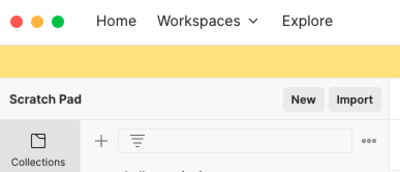In this code challenge, you'll be working with a Pizza Restaurant domain.
In this repo:
- There is a Flask application with some features built out.
- There is a fully built React frontend application.
- There are tests included which you can run using
pytest -x. - There is a file
challenge-1-pizzas.postman_collection.jsonthat contains a Postman collection of requests for testing each route you will implement.
Depending on your preference, you can either check your API by:
- Using Postman to make requests
- Running
pytest -xand seeing if your code passes the tests - Running the React application in the browser and interacting with the API via the frontend
You can import challenge-1-pizzas.postman_collection.json into Postman by
pressing the Import button.
Select Upload Files, navigate to this repo folder, and select
challenge-1-pizzas.postman_collection.json as the file to import.
The instructions assume you changed into the code-challenge folder prior
to opening the code editor.
To download the dependencies for the frontend and backend, run:
pipenv install
pipenv shell
npm install --prefix clientYou can run your Flask API on localhost:5555 by
running:
python server/app.pyYou can run your React app on localhost:4000 by
running:
npm start --prefix clientYou are not being assessed on React, and you don't have to update any of the React code; the frontend code is available just so that you can test out the behavior of your API in a realistic setting.
Your job is to build out the Flask API to add the functionality described in the deliverables below.
All of the deliverables are graded for the code challenge.
You will implement an API for the following data model:
The file server/models.py defines the model classes without relationships.
Use the following commands to create the initial database app.db:
export FLASK_APP=server/app.py
flask db init
flask db migrate
flask db upgrade headNow you can implement the relationships as shown in the ER Diagram:
- A
Restauranthas manyPizzas throughRestaurantPizza - A
Pizzahas manyRestaurants throughRestaurantPizza - A
RestaurantPizzabelongs to aRestaurantand belongs to aPizza
Update server/models.py to establish the model relationships. Since a
RestaurantPizza belongs to a Restaurant and a Pizza, configure the model
to cascade deletes.
Set serialization rules to limit the recursion depth.
Run the migrations and seed the database:
flask db revision --autogenerate -m 'message'
flask db upgrade head
python server/seed.pyIf you aren't able to get the provided seed file working, you are welcome to generate your own seed data to test the application.
Add validations to the RestaurantPizza model:
- must have a
pricebetween 1 and 30
Set up the following routes. Make sure to return JSON data in the format specified along with the appropriate HTTP verb.
Recall you can specify fields to include or exclude when serializing a model instance to a dictionary using to_dict() (don't forget the comma if specifying a single field).
NOTE: If you choose to implement a Flask-RESTful app, you need to add code to
instantiate the Api class in server/app.py.
Return JSON data in the format below:
[
{
"address": "address1",
"id": 1,
"name": "Karen's Pizza Shack"
},
{
"address": "address2",
"id": 2,
"name": "Sanjay's Pizza"
},
{
"address": "address3",
"id": 3,
"name": "Kiki's Pizza"
}
]Recall you can specify fields to include or exclude when serializing a model
instance to a dictionary using to_dict() (don't forget the comma if specifying
a single field).
If the Restaurant exists, return JSON data in the format below:
{
"address": "address1",
"id": 1,
"name": "Karen's Pizza Shack",
"restaurant_pizzas": [
{
"id": 1,
"pizza": {
"id": 1,
"ingredients": "Dough, Tomato Sauce, Cheese",
"name": "Emma"
},
"pizza_id": 1,
"price": 1,
"restaurant_id": 1
}
]
}If the Restaurant does not exist, return the following JSON data, along with
the appropriate HTTP status code:
{
"error": "Restaurant not found"
}If the Restaurant exists, it should be removed from the database, along with
any RestaurantPizzas that are associated with it (a RestaurantPizza belongs
to a Restaurant). If you did not set up your models to cascade deletes, you
need to delete associated RestaurantPizzas before the Restaurant can be
deleted.
After deleting the Restaurant, return an empty response body, along with the
appropriate HTTP status code.
If the Restaurant does not exist, return the following JSON data, along with
the appropriate HTTP status code:
{
"error": "Restaurant not found"
}Return JSON data in the format below:
[
{
"id": 1,
"ingredients": "Dough, Tomato Sauce, Cheese",
"name": "Emma"
},
{
"id": 2,
"ingredients": "Dough, Tomato Sauce, Cheese, Pepperoni",
"name": "Geri"
},
{
"id": 3,
"ingredients": "Dough, Sauce, Ricotta, Red peppers, Mustard",
"name": "Melanie"
}
]This route should create a new RestaurantPizza that is associated with an
existing Pizza and Restaurant. It should accept an object with the following
properties in the body of the request:
{
"price": 5,
"pizza_id": 1,
"restaurant_id": 3
}If the RestaurantPizza is created successfully, send back a response with the
data related to the RestaurantPizza:
{
"id": 4,
"pizza": {
"id": 1,
"ingredients": "Dough, Tomato Sauce, Cheese",
"name": "Emma"
},
"pizza_id": 1,
"price": 5,
"restaurant": {
"address": "address3",
"id": 3,
"name": "Kiki's Pizza"
},
"restaurant_id": 3
}If the RestaurantPizza is not created successfully due to a validation
error, return the following JSON data, along with the appropriate HTTP status
code:
{
"errors": ["validation errors"]
}
